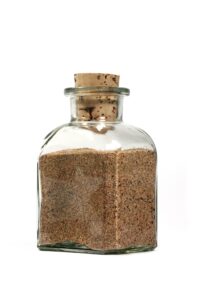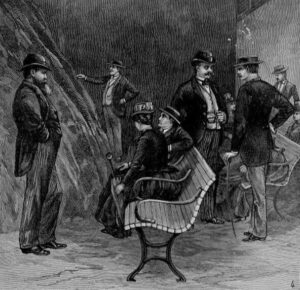This chiropodist appears to have been a fine, upstanding member of the community rather than a charlatan – but his advertisement has just enough of the yuk factor to make it worth including.
Joel Farbstein was born in Warsaw in about 1820 but probably spent some time in London before settling in Hull in the 1840s. He advertised heavily in the Hull Packet through the 1850s and 60s, often telling patients that they had better get in quick because he had been summoned to another part of the country. This was no ruse – he also advertised in other regional papers to say he was in town for a few days. For example, in The Bristol Mercury in March 1855, he advised that he would be in Clifton for “EIGHT DAY’s ONLY.” Never let it be said that the grocer’s apostrophe is confined to the yoof of today.
(Image from Nordisk familjebok, vol. 8 1908)
In 1865 Mr Farbstein’s career was interrupted by a macabre incident … but first, the advert:
EFFICACIOUS CURE FOR CORNS, BUNIONS
AND DEFORMED NAILS.
J. FARBSTEIN, CHIROPODIST, for nine years
resident in Hull, has the honour to inform the
nobility, Gentry, and Inhabitants of Hull, that by a
method peculiar to himself, he completely eradicates
Corns, Bunions, Nails growing in the Flesh, from the
child to the adult, without causing the slightest pain:
the patient is enabled immediately after attendance to
walk with perfect ease and comfort. J. F. has been
favoured with upwards of 500 Testimonials from parties
in Hull and its vicinity, who has been cured by him.
May be consulted daily from 9 a.m. to 5 p.m.—Parties
in the country attended on reasonable Terms.
Mr. FARBSTEIN begs to caution persons against that
evil practice of allowing their corns to be cut by strangers
or unskilful persons, as it is at all times highly danger-
ous and frequently entails serious consequences.
Observe the Address! No. 11 Bourne-street, Hull.
Source: The Hull Packet and East Riding Times, Friday 6th February 1857
In 1865, Mr. Farbstein, as president of Hull’s Hebrew congregation, authorised a burial in the Jewish cemetery. The deceased was a baby that had been born at six months’ gestation and survived for only a short period. After the burial, internal politics overcame sensitivity and a Mr. Lewis Marks, claiming to be the congregation’s rightful president, asserted that the burial was unlawful unless authorised by him. He and his supporters dug up the baby and delivered it back to its parents’ house, where the distraught father did everything possible to hide the incident from his wife. This gruesome story was reported throughout the country when the case came to court, with Marks and his cronies charged with the illegal disinterment of the child.
In court in March 1865, Mr. Farbstein “suddenly ran upon the bench, and, quivering with intense excitement, showed a bundle of papers to the magistrate, at the same time uttering several scarcely comprehensible exclamations.” (Hull Packet, March 17th, 1865)
This suggests he had found some useful evidence and was excited about showing it to the court … but he was immediately dispatched to a lunatic asylum. Observers suspected foul play and fought to get him released, and after a week of incarceration he was handed over into the care of two “keepers.” His mental state nor his standing in the community appear to have suffered in the long term – by May that year he was advertising his chiropody services as before, and being elected onto the committee of the Hull Harmonic Society.
Mr. Farbstein died in 1888. His daughter Eva was an acclaimed soprano and music teacher, achieving fame as far as London, and his son Louis and younger daughter Amelia followed in his footsteps as chiropodists.



